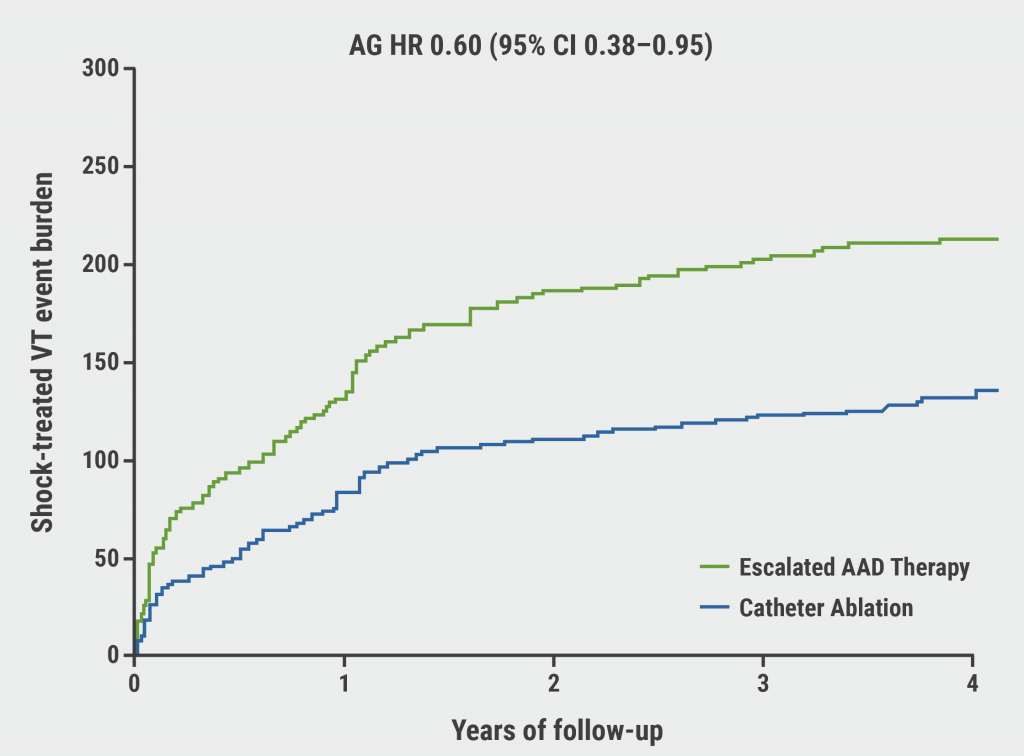https://doi.org/10.55788/b1b6ad83
Dr Jana Haskova (Institute for Clinical and Experimental Medicine, Czechia) and colleagues conducted a retrospective study to analyse major vascular complications due to catheter ablation in patients with AF [1]. Included were 4,646 participants who underwent catheter ablation (mean age 61; 33% women), of whom 2,330 were operated on with an ultrasound-guided vascular access strategy. The other 2,316 participants were non-ultrasound guided historic controls. The primary outcome was the number of major complications, defined as complications that required surgery, led to prolonged hospital duration, resulted in re-hospitalisation, or were complications that consisted of significant haematoma/bleeding with a haemoglobin drop >30 g/L.
The rate of major vascular complications was significantly lower in the ultrasound-guided population than in the historic controls (1.38% vs 2.66%; P=0.003) (see Figure). Moreover, the number of major complications that required surgical intervention was reduced in the ultrasound-guided arm compared with the non-ultrasound-guided arm (0.26% vs 0.77%; P=0.02). Dr Haskova added that older age was associated with a higher complication rate (P=0.0002), whereas male sex was related to a lower complication rate (P=0.003).
Figure: Major vascular complications for ultrasound-guided and control participants [1]

Dr Haskova concluded: “An ultrasound-guided vascular access strategy was associated with a statistically significant reduction of major vascular complications after catheter ablation for AF. Therefore, the routine use of ultrasound guidance is recommended to improve the safety of venous vascular access in patients with AF who undergo ablation.”
- Haskova J, et al. Ultrasound-guided femoral venipuncture for catheter ablation of atrial fibrillation: clinical benefit. Atrial fibrillation and ablation, EHRA 2022, 3–5 April, Copenhagen, Denmark.
Copyright ©2022 Medicom Medical Publishers
Posted on
Previous Article
« Conduction system pacing potential alternative for biventricular pacing in heart failure Next Article
Pulsed-field ablation reduces neurocardiac damage versus cryoballoon ablation »
« Conduction system pacing potential alternative for biventricular pacing in heart failure Next Article
Pulsed-field ablation reduces neurocardiac damage versus cryoballoon ablation »
Table of Contents: EHRA 2022
Featured articles
Letter from the Editor
Diagnostics and Prevention
Cardiac magnetic resonance imaging improves prediction of post-MI sudden cardiac death
AI model accurately predicts sudden cardiac death in overall population
AI model accurately discriminates between arrhythmias
Impact of AF screening on stroke prevention influenced by systolic blood pressure
Developments in Devices
Conduction system pacing potential alternative for biventricular pacing in heart failure
Left bundle branch area pacing is a feasible technique for HF and bradyarrhythmia
Focus on the efficacy of cardiac resynchronisation therapy in HF plus concomitant AF
RESET: No survival benefit of CRT-defibrillator over CRT-pacemaker in heart failure
Insertable cardiac monitors effective for AF detection in cryptogenic stroke
Updates on Ablation
First results of the POWER FAST III trial
Real-world safety results on pulsed-field ablation with pentaspline catheter
VANISH: Ablation reduces shock burden compared with anti-arrhythmic drug in ventricular tachycardia
Low AF recurrence rates after PVI using pulsed-field ablation
Pulsed-field ablation reduces neurocardiac damage versus cryoballoon ablation
Ultrasound-guided femoral venipuncture reduces complications in catheter ablation
News on Atrial Fibrillation
Sex differences revealed in AF determinants and AF progression
Early rhythm-control therapy efficacious in men and women with AF
Progression in remote app-based monitoring of atrial fibrillation
Other Topics
Benefits of SGLT2 inhibitors may extend beyond HF-associated outcomes
© 2024 Medicom Medical Publishers. All rights reserved. Terms and Conditions | Privacy Policy


